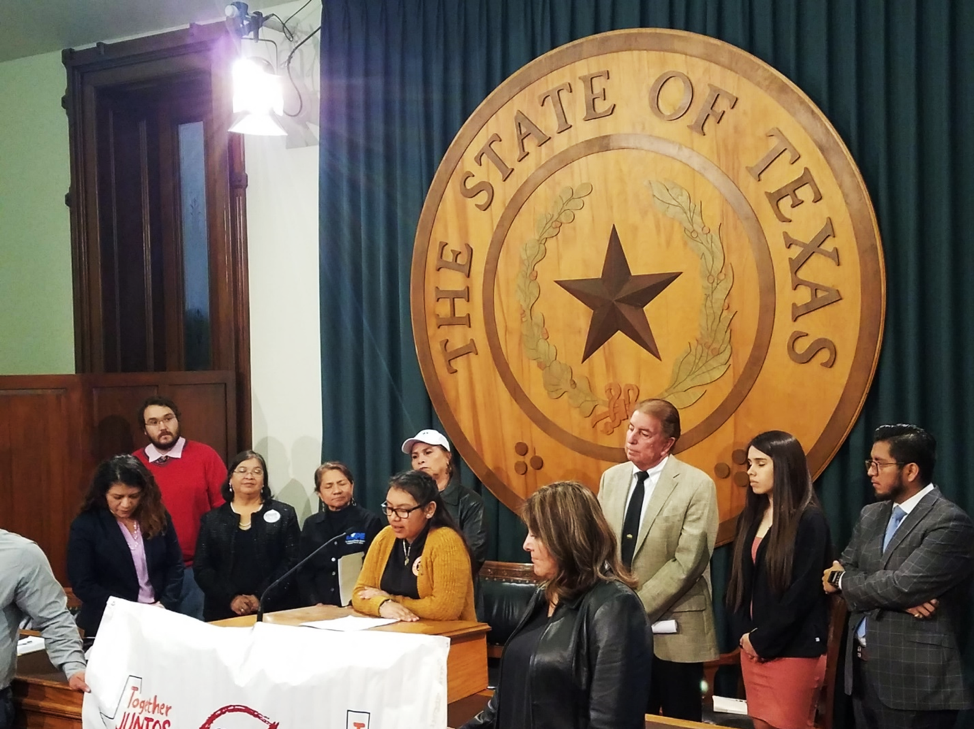“They call us DREAMers, but we’re the ones who don’t sleep.”
In-state tuition eligibility for Texas DREAMers is at the mercy of Texas legislators
By Amparo Diaz, UnidosUS Escalera Manager
During a press conference at the Texas Capitol, youth spoke about the importance of tuition equity policies in the state. Miriam Manzano, an Escalera STEM student from East Austin College Prep, spoke out against the repeal of the Texas Dream Act, which would result in higher tuition prices for college-bound DREAMers.
Keep up with the latest from UnidosUS
Sign up for the weekly UnidosUS Action Network newsletter delivered every Thursday.

There are an estimated 200,000–225,000 college students across the nation who are undocumented. In states that allow undocumented students to enroll in college, the biggest hurdle they face when deciding whether to enroll—or whether to continue attending once enrolled—is paying for tuition. Students who benefit from the Texas Dream Act qualify for state grants and other state-based aid but they remain ineligible for federal financial assistance including grants, loans, and work study opportunities. The Texas Dream Act also allows undocumented students to qualify for in-state tuition rates (ISTR) if they meet residency classification.
For tuition purposes, a student is considered a resident if they have lived in the state in the three years before high school graduation, lived in Texas the year before enrolling in college, and they sign an affidavit expressing their intention to apply for legal residency as soon as they become eligible. Residency classification is crucial when it comes to college affordability given that the difference in tuition rates for nonresident versus resident students can be more than four times as much at community colleges in central Texas.
Across the nation, Latino students tend to either not enroll in college, or choose community college as their first-choice postsecondary institution. In Texas, over two-thirds of students who benefit from the Texas Dream Act attend a two-year college, technical school, or state college. A study by the UndocuScholars project found that almost three-quarters of students expressed concerns about financing their education. Thus, any changes to the Texas Dream Act that affect student eligibility for ISTR—making college more expensive and difficult to finance—could result in lower enrollment rates among undocumented students in Texas.
“If the Texas Dream Act is removed, this will certainly make things more difficult for myself and many other undocumented students who are simply trying to further our education and contribute to society,” says a top student in a Texas high school who asked to remain anonymous. “HB 413 will not only make me pay more money, but could ruin the opportunity to go to college to obtain everything I have worked so hard for.”
House Bill 413 in the 86th Texas Legislature
“The world would be such a better place if instead of discriminating [against] undocumented students, [Texas legislators] would embrace us and understand that our state would lose so much if we pass this law,” writes a Texas high school junior.
In 2001, Texas paved the way for immigrant rights in education with the Texas Dream Act. Today, 18 states provide ISTR to undocumented students, but that figure may soon change. The Texas Dream Act is currently being challenged by House Bill 413 in the 86th Texas Legislature. HB 413 amends the Texas Dream Act to include the following language: “A person who is not authorized under federal statute to be present in the United States may not be considered a resident of this state for purposes of this title.” If HB 413 passes, undocumented students will lose residency status for tuition purposes and eligibility for state-based financial aid, resulting in increased difficulty in paying for college.
ISTR benefits impact college enrollment and completion rates of undocumented Latinos
An article published in the Review of Higher Education by Stella M. Flores, EdD, from NYU reports that undocumented Latino students are more likely to enroll in college in states with ISTR policies than those in a state without such a policy. Flores finds that in Texas, students were more likely to attend college after the introduction of the Texas Dream Act.
According to the Migration Policy Institute, ISTR allowed for undocumented students to enroll in more classes per semester, in turn decreasing the time it took to earn their degrees. Therefore, it is evident that HB 413 could negatively impact the college enrollment and completion rates of undocumented students in the state of Texas.
“We are all people who are trying to do good in our communities,” writes a top Texas high school student. “Being a high school senior with an undocumented status has already shown me how my options are fewer in comparison to my peers. I have more limitations. It is already difficult to receive financial aid and take out loans, so [HB 413] will prevent many from being able to afford attending a postsecondary institution in Texas, something I want to do to be an educated individual and help my family improve economically.”
An educated workforce benefits all Texans
Texas has the second-largest population of undocumented students in the nation. Offering undocumented students ISTR benefits results in a higher college graduation rate that can, in turn, result in a more skilled workforce and a healthier outlook for Texas businesses and communities—something that benefits all Texans. According to the Economic Policy Institute, a well-educated workforce is key to state prosperity.
Those who argue that Texas DREAMers are robbing their citizen peers from an opportunity to receive a higher education fail to recognize the $1.5 billion that undocumented immigrants pay in state and local taxes annually, which partially supports Texas colleges and universities. They also fail to realize that out of all the students who received state assistance to pay for tuition, only 1.8% of them were Texas Dream Act students. While Texas DREAMers received $10.97 million in state-funded grants, they paid $58.3 million in tuition and fees to institutions of higher education.
“HB 413 is a slap in the face of young DREAMers who have spent their whole lives [in Texas],” the anonymous student says. “This is the land they call home and this law puts high achieving students down.”
Practices to support undocumented college students
If HB 413 passes in Texas, the number of undocumented Latino students who enroll in and complete college will drop. Despite laws that intend to make it harder for undocumented students to attend college in some states, institutions of higher education in some areas have the power to enact policies that provide financial assistance and ISTR to undocumented students. Institutions of higher education can also establish undocumented student resource centers to aid in retaining these students once enrolled.
Organizations and foundations can provide additional assistance through scholarships and other forms of monetary aid. High schools can offer their students opportunities to earn college credit through dual enrollment, Advanced Placement, and CLEP (College Level Examination Program) exams. Participation in college-readiness programs, such as UnidosUS’s Escalera initiatives, empower all students, regardless of their background, and help them prepare their academic profile to make them more competitive for scholarship awards.
As outlined above, there are many ways that organizations and institutions can make college more affordable for undocumented students. Despite this, Congress must enact policies that enable all residents who want to benefit from an education equitable and affordable access to do so.
“We are destined for greatness,” the student says. “We just need a chance.”


